牛津上海版六年级上册英语(试用本)点读机下载
- 格式:doc
- 大小:62.00 KB
- 文档页数:15
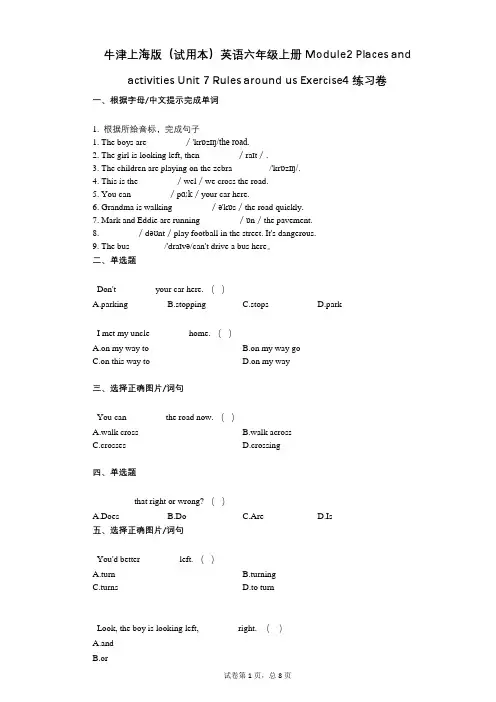
牛津上海版(试用本)英语六年级上册 Module2 Places and activities Unit 7 Rules around us Exercise4练习卷一、根据字母/中文提示完成单词1. 根据所给音标,完成句子1. The boys are ________/'krɒzɪŋ/the road.2. The girl is looking left, then ________/raɪt/.3. The children are playing on the zebra ________/'krɒzɪŋ/.4. This is the ________/wel/we cross the road.5. You can ________/pɑːk/your car here.6. Grandma is walking ________/ə'kɒs/the road quickly.7. Mark and Eddie are running ________/ɒn/the pavement.8. ________/dəʊnt/play football in the street. It's dangerous.9. The bus________/'draɪvə/can't drive a bus here。
二、单选题Don't ________ your car here. ()A.parkingB.stoppingC.stopsD.parkI met my uncle ________ home. ()A.on my way toB.on my way goC.on this way toD.on my way三、选择正确图片/词句You can ________ the road now. ()A.walk crossB.walk acrossC.crossesD.crossing四、单选题________ that right or wrong? ()A.DoesB.DoC.AreD.Is五、选择正确图片/词句You'd better ________ left. ()A.turnB.turningC.turnsD.to turnLook, the boy is looking left, ________ right. ()A.andB.orC.butD.thenDon't eat ________ ice cream. ()A.so manyB.too muchC.manyD.several________ be late again. ()A.NotB.Doesn'tC.Don'tD.Aren't六、对划线部分提问根据要求改写句子1. You have to book the ticket. (改为否定句)________________2. We can find signs everywhere in the world. (对划线部分提问)________________3. We can cross the road here.(改为否定句)________________4. You can see the escalator in the middle. (对划线部分提问)________________5. I'd like strawberries. (保持原句意思)I ________ ________.七、阅读选择阅读短文,选出正确的答案Helen has four brothers and sisters. They are Jenny, Peter, Bill and Anna. Helen is the oldest of them. Jenny is thirteen years old. She is two years younger than Helen, and one year older than Peter. Bill is nine and Anna is seven years old. Jenny and Peter are good runners. But Peter can run faster. Helen and Anna like to play basketball after school. Helen plays better than Anna. Bill is the best singer of the five. Helen and Betty study in a middle school. Peter, Bill and Anna study in an elementary school. They all work hard at their lessons. They help each one another(互相) and they love one another.(1)How old is Helen? ( )A.ElevenB.FifteenC.TwelveD.fourteen(2)Who play basketball better than Anna? ( )A.AnnB.HelenC.JennyD.Peter(3)Who runs fastest of the five? ( )A.JennyB.PeteC.Jenny and PeterD.All of them(4)Who can sing best? ( )A.AnnB.HelenC.PeterD.Bill八、其他作文写作We have rules in our school参考答案与试题解析牛津上海版(试用本)英语六年级上册 Module2 Places and activities Unit 7 Rules around us Exercise4练习卷一、根据字母/中文提示完成单词1.【答案】1. crossing,2. right,B. crossing,4. way,5. park,6. across,7. on,8. Don't,9. driver【考点】副词形容词介词名词Places and activities: What would you like to be?【解析】此题暂无解析【解答】1. 句意:那些男孩们……马路。
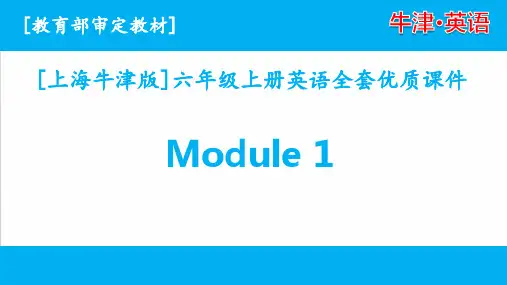
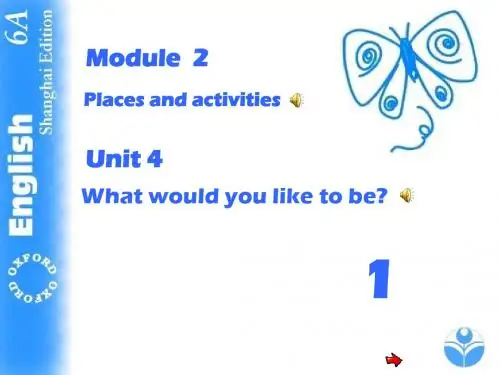
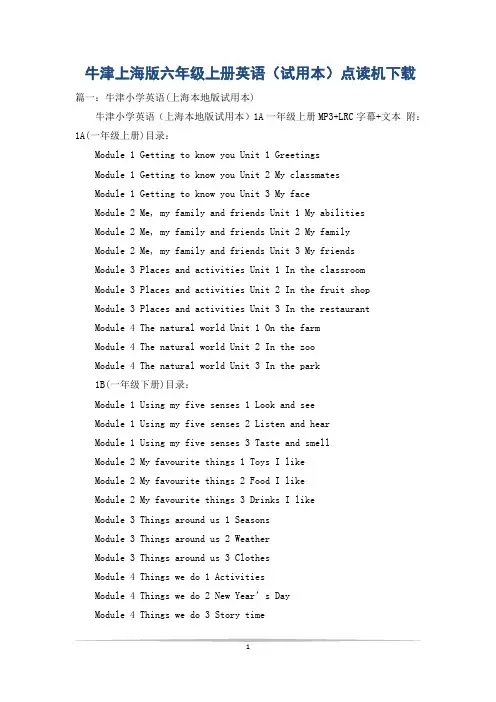
牛津上海版六年级上册英语(试用本)点读机下载篇一:牛津小学英语(上海本地版试用本)牛津小学英语(上海本地版试用本)1A一年级上册MP3+LRC字幕+文本附:1A(一年级上册)目录:Module 1 Getting to know you Unit 1 GreetingsModule 1 Getting to know you Unit 2 My classmatesModule 1 Getting to know you Unit 3 My faceModule 2 Me, my family and friends Unit 1 My abilitiesModule 2 Me, my family and friends Unit 2 My familyModule 2 Me, my family and friends Unit 3 My friendsModule 3 Places and activities Unit 1 In the classroomModule 3 Places and activities Unit 2 In the fruit shopModule 3 Places and activities Unit 3 In the restaurantModule 4 The natural world Unit 1 On the farmModule 4 The natural world Unit 2 In the zooModule 4 The natural world Unit 3 In the park1B(一年级下册)目录:Module 1 Using my five senses 1 Look and seeModule 1 Using my five senses 2 Listen and hearModule 1 Using my five senses 3 Taste and smellModule 2 My favourite things 1 Toys I likeModule 2 My favourite things 2 Food I likeModule 2 My favourite things 3 Drinks I likeModule 3 Things around us 1 SeasonsModule 3 Things around us 2 WeatherModule 3 Things around us 3 ClothesModule 4 Things we do 1 ActivitiesModule 4 Things we do 2 New Yea r’s DayModule 4 Things we do 3 Story time2A(二年级上册)目录:Module 1 Getting to know you 1 HelloModule 1 Getting to know you 2 I’m DannyModule 1 Getting to know you 3 A new classmateModule 2 Me, my family and friends 1 I cam swimModule 2 Me, my family and friends 2 That’s my familyModule 2 Me, my family and friends 3 My hair is short Module 3 Places and activities 1 In the children’s garden Module 3 Places and activities 2 In my roomModule 3 Places and activities 3 In the kitchenModule 4 The natural world 1 In the skyModule 4 The natural world 2 In the forestModule 4 The natural world 3 In the street2B(二年级下册)目录:Module 1 Using my five senses 1 What can you see?Module 1 Using my five senses 2 Touch and feelModule 1 Using my five senses 3 What can you hear?Module 2 My favourite things 1 Things I like doingModule 2 My favourite things 2 My favourite foodModule 2 My favourite things 3 Animals I likeModule 3 Things around us 1 The four seasonsModule 3 Things around us 2 RulesModule 3 Things around us 3 My clothesModule 4 More things to learn 1 ActivitiesModule 4 More things to learn 2 Mother’s DayModule 4 More things to learn 3 Story time3A(三年级上册)目录:Module 1 Getting to know you 1 Unit 1 How are you?Module 1 Getting to know you 2 Unit 2 What’s your name?Module 1 Getting to know you 3 Unit 3 How old are you?Module 2 Me, my family and friends 1 Unit 1 my friendsModule 2 Me, my family and friends 2 Unit 2 My familyModule 2 Me, my family and friends 3 Unit 3 About meModule 3 Places and activities 1 Unit 1 My schoolModule 3 Places and activities 2 Unit 2 ShoppingModule 3 Places and activities 3 Unit 3 In the parkModule 4 The natural world 1 Unit 1 InsectsModule 4 The natural world 2 Unit 2 On the farmModule 4 The natural world 3 Unit 3 Plants3B(三年级下册)目录:Module 1 Using my five senses 1 Seeing and hearingModule 1 Using my five senses 2 Touching and feelingModule 1 Using my five senses 3 Tasting and smellingModule 2 My favourite things 1 AnimalsModule 2 My favourite things 2 ToysModule 2 My favourite things 3 ClothesModule 3 Things around us 1 ShapesModule 3 Things around us 2 ColoursModule 3 Things around us 3 SeasonsModule 4 More things to learn 1 My bodyModule 4 Mor e things to learn 2 Children’s DayModule 4 More things to learn 3 Story time4A(四年级上册)目录:Module 1 Getting to know you Unit 1 Hello againModule 1 Getting to know you Unit 2 How old are you?Module 1 Getting to know you Unit 3 What are you?Module 2 Me, my family and friends Unit 1 A new classmate Module 2 Me, my family and friends Unit 2 How do you feel? Module 2 Me, my familyand friends Unit 3 FriendsModule 3 Places and activities Unit 1 In the schoolModule 3 Places and activities Unit 2 FoodModule 3 Places and activities Unit 3 A class picnicModule 4 The natural world Unit 1 On the farmModule 4 The natural world Unit 2 More insects and plants Module 4 The natural world Unit 3 A day in the park4B(四年级下册)目录:Module 1 Using my five senses Unit 1 Look!Module 1 Using my five senses Unit 2 What can you hear?Module 1 Using my five senses Unit 3 What can you feel?Module 1 Using my five senses Unit 4 What can you smell and taste? Module 2 My favourite things Unit 1 My petModule 2 My favourite things Unit 2 My toysModule 2 My favourite things Unit 3 A busy familyModule 3 Things around us Unit 1 Colours and placesModule 3 Things around us Unit 2 Listen!Module 3 Things around us Unit 3 Weather5A(五年级上册)目录:Module 1 Getting to know you Unit 1 Can I do this?Module 1 Getting to know you Unit 2 This is what I wantModule 1 Getting to know you Unit 3 This is what I needModule 1 Getting to know you More oral practiceModule 2 Me, my family and friends Unit 1 MeModule 2 Me, my family and friends Unit 2 Are you happy? Module 2 Me, my family and friends Unit 3 A birthday party Module 2 Me, my family and friends More oral practiceModule 3 Places and activities Unit 1 A day at school Module 3 Places and activities Unit 2 Let’s go shopping! Module 3Places and activities Unit 3 Follow the signs!Module 3 Places and activities More oral practiceModule 4 The natural world Unit 1 Wild animalsModule 4 The natural world Unit 2 ButterfliesModule 4 The natural world Unit 3 Parks and places in China Module 4 The natural world More oral Practice5B(五年级下册)目录:Module I Using my five senses Unit 1 Use your eyes!Module I Using my five senses Unit 2 Use your ears!Module I Using my five senses Unit 3 Use your hands!Module I Using my five senses Unit 4 Use your five senses! Module I Using my five senses More oral practiceModule 2 My favourite things Unit 1 Animals in the zoo Module 2 My favourite things Unit 2 Favourite toysModule 2 My favourite things Unit 3 At homeModule 2 My favourite things More oral practiceModule 3 Things around us Unit 1 Colours around usModule 3 Things around us Unit 2 Different noisesModule 3 Things around us Unit 3 What is the weather like? Module 3 Things around us More oral practice6A(六年级上册)目录:Module 1 Family and friends Unit 1 Family and relatives Module 1 Family and friends Unit 2 I have a good friendModule 1 Family and friends Unit 3 Spending a day out together Module 1 Family and friends Now listenModule 2 Places and activities Unit 4 What would you like to be? Module 2 Places and activities Unit 5 Open DayModule 2 Places and activities Unit 6 Going to schoolModule 2 Places and activities Unit 7 Rules round usModule 2 Places and activities Now listenModule 3 Food and drink Unit 8 The food we eatModule 3 Food and drink Unit 9 Picnics are funModule 3 Food and drink Unit 10 Healthy eatingModule 3 Food and drink Unit 11 Let’s make a pizzaModule 3 Food and drink Now listen6B(六年级下册)目录:10版目录:Module 1 City lifeUnit 1 Great cities in AsiaUnit 2 At the airportUnit 3 Dragon Boat FestivalUnit 4 Staying healthyModule 2 ChangesUnit 1 What will I be like?Unit 2 Seasonal changesUnit 3 Travelling in Garden CityModule 3 The natural worldUnit 1 Windy weatherUnit 2 Sea water and rain water Unit 3 Forests and land?篇二:上海版牛津英语六年级(上、下)全重点知识点复习整理上海牛津英语六年级上下册全知识点梳理频度副词always/sometimes/usually/never 是频度副词,提问应该要用How often??在句中的位置是:放在行为动词的前面,放在be动词的后面。
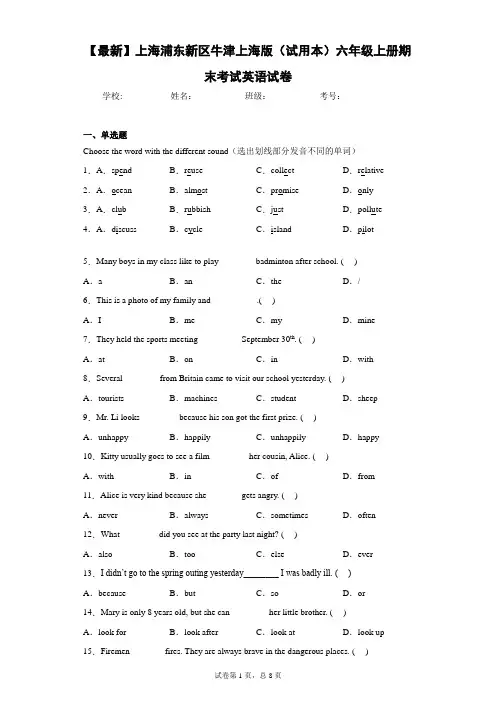
【最新】上海浦东新区牛津上海版(试用本)六年级上册期末考试英语试卷学校:___________姓名:___________班级:___________考号:___________一、单选题Choose the word with the different sound(选出划线部分发音不同的单词)1.A.spend B.reuse C.collect D.relative 2.A.ocean B.almost C.promise D.only 3.A.club B.rubbish C.just D.pollute 4.A.discuss B.cycle C.island D.pilot5.Many boys in my class like to play________ badminton after school. ( )A.a B.an C.the D./6.This is a photo of my family and __________.( )A.I B.me C.my D.mine 7.They held the sports meeting _________ September 30th. ( )A.at B.on C.in D.with 8.Several________ from Britain came to visit our school yesterday. ( )A.tourists B.machines C.student D.sheep 9.Mr. Li looks ________ because his son got the first prize. ( )A.unhappy B.happily C.unhappily D.happy 10.Kitty usually goes to see a film ________ her cousin, Alice. ( )A.with B.in C.of D.from 11.Alice is very kind because she _______ gets angry. ( )A.never B.always C.sometimes D.often 12.What ________ did you see at the party last night? ( )A.also B.too C.else D.ever13.I didn’t go to the spring outing yesterday________ I was badly ill. ( )A.because B.but C.so D.or 14.Mary is only 8 years old, but she can ________ her little brother. ( )A.look for B.look after C.look at D.look up 15.Firemen _______ fires. They are always brave in the dangerous places. ( )A.find out B.pick up C.put out D.put up 16.Students _______ talk loudly in the school library. ( )A.can B.needn’t C.mustn’t D.should 17.---________didn’t Tony take part in t he school sports meeting yesterday afternoon? ( ) ---Because he got a bad cold.A.What B.When C.Where D.Why18.--- _______ do you visit your grandparents? ( )--- Twice a week.A.How long B.How often C.How soon D.How far 19.To be Friends of the Earth, we should tell people________ on the ground. ( )A.not leave rubbish B.not to leave rubbishC.not leaving rubbish D.to not leave rubbish20.Bob has ________ that he will get to school on time next time. ( )A.promised B.picked C.shared D.finished 21.Joe _______ the Space Museum tomorrow afternoon. ( )A.will visit B.visits C.visited D.has visited 22.I _______ to the school choir in the hall yesterday. ( )A.will listen B.listen C.listened D.has listened 23.---What a sunny day! Shall we visit Sheshan Forest Park? ( )---________.A.No, we won’t B.That’s all rightC.Thank you D.That’s a good idea二、语音选择题24.I am a little hungry. Can I have some bread? Which of the following is correct for the underlined word? ( )A./bred/ B./breid/ C./braid/ D./bræd/三、选内容补全对话/短文Complete the following passage with the words or phrases in the box. Each can only be used once (将下列单词或词组填入空格。
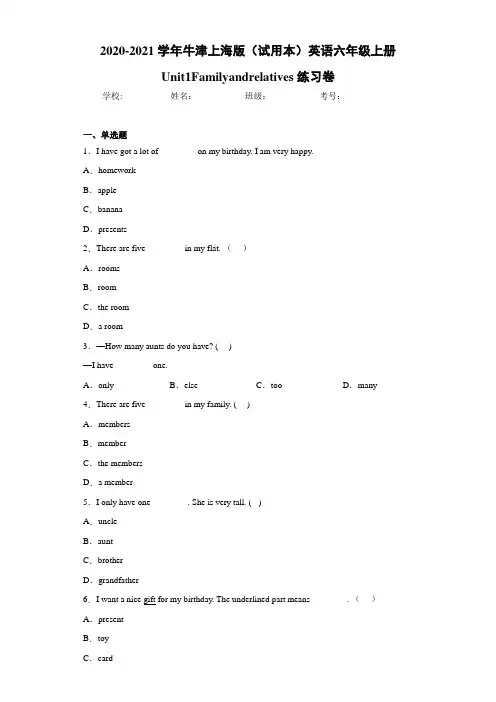
2020-2021学年牛津上海版(试用本)英语六年级上册Unit1Familyandrelatives练习卷学校:___________姓名:___________班级:___________考号:___________一、单选题1.I have got a lot of ________ on my birthday. I am very happy.A.homeworkB.appleC.bananaD.presents2.There are five ________ in my flat. ()A.roomsB.roomC.the roomD.a room3.—How many aunts do you have? ( )—I have ________ one.A.only B.else C.too D.many 4.There are five ________ in my family. ( )A.membersB.memberC.the membersD.a member5.I only have one ________. She is very tall. ( )A.uncleB.auntC.brotherD.grandfather6.I want a nice gift for my birthday. The underlined part means ________. ()A.presentB.toyC.cardD.book7.I have got a postcard ________ my parents. ()A.fromB.withC.atD.by8.I want a nice gift for my birthday. The underlined part means ________. ()A.needB.getC.buyD.have9.Every family has a family ________.A.relativesB.namesC.treesD.tree二、选择正确图片/词句10.What else do you do with ________? ( )A.they B.their C.them D.themselves三、任务型阅读11.阅读短文并回答下列问题。
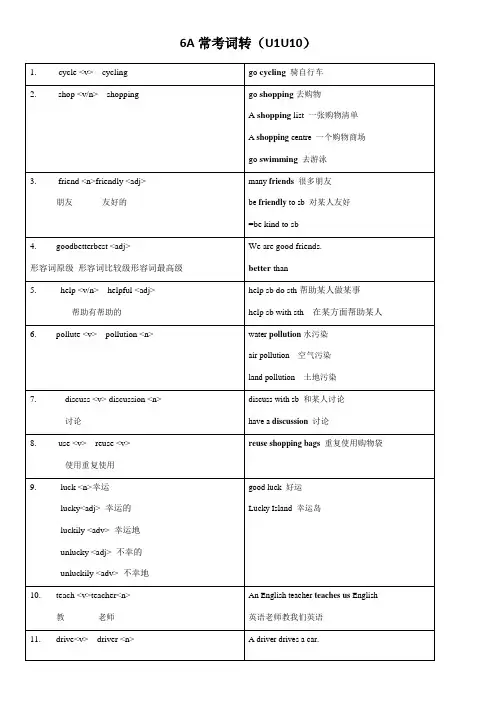
6A常考词转(U1U10)词义辨析1.hear意为“听见;听到”,指不是有意识地听,侧重于“听”的结果,不可以用在进行时态中。
如:What did you hear just now? 你刚才听见什么了?listen意为“听”,指有意识地听,但不一定能听见,侧重于“听”的动作,其后常接介词to,可以用在进行时态中。
如:Jack is listening to the teacher carefully in class. 杰克正在课堂上认真听讲。
2.in the morning 意为“在上午”,类似的还有in the afternoon和in the evening;但是表示在具体某一天的上午、下午和晚上时介词应用“on”。
如:My mother always goes shopping in the afternoon.My mother always goes shopping on Sunday afternoon.3.look for 指“寻找”某物(未必找到),强调动作;find 指“找到”某物,强调结果;find out表示“查明”,指通过努力去查明事情的真相等。
如:The teacher tries to find out who is not in the classroom.4.people (天生复数词)指“人群;人们”;而person 指“单个人;某一个人”。
因此,“一个人”可以说成a person,但不能说成a people。
如:Each person has his own characteristic (特征).Many people like playing basketball.5.work是不可数名词,意为“工作”;而job是可数名词,意为“职业”。
如:She does a lot of work every day, so she is always tired. 她每天都要做很多工作,所以她总是很累。
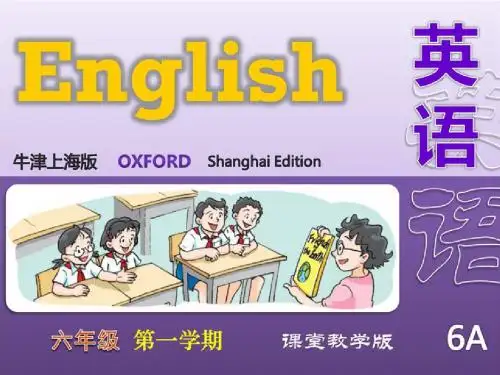
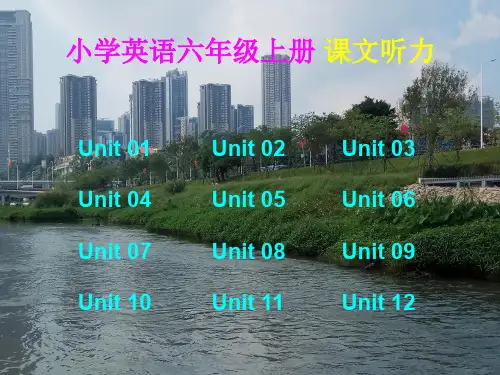
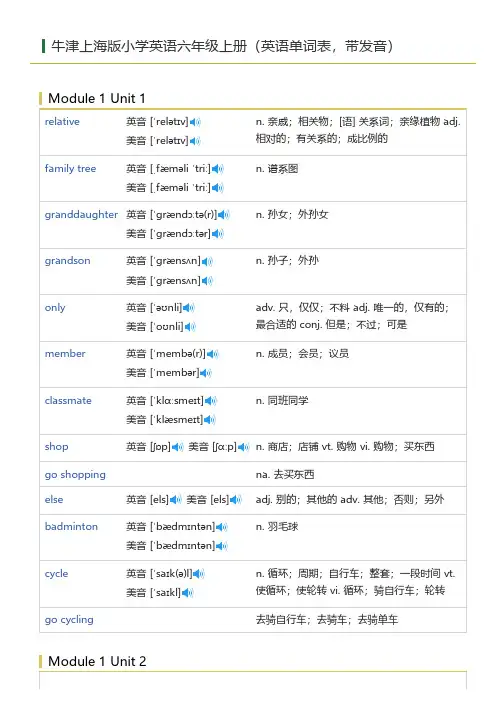
牛津上海版小学英语六年级上册(英语单词表,带发音)Module 1 Unit 1Module 1 Unit 2relative英音 [ˈrel ət ɪv]美音 [ˈrel ət ɪv]n. 亲戚;相关物;[语] 关系词;亲缘植物 adj.相对的;有关系的;成比例的family tree英音 [ˌfæm əli ˈtri ː]美音 [ˌfæm əli ˈtri ː]n. 谱系图granddaughter 英音 [ˈɡrænd ɔːt ə(r)]美音 [ˈɡrænd ɔːt ər]n. 孙女;外孙女grandson英音 [ˈɡræns ʌn]美音 [ˈɡræns ʌn]n. 孙子;外孙only英音 [ˈəʊnli]美音 [ˈo ʊnli]adv. 只,仅仅;不料 adj. 唯一的,仅有的;最合适的 conj. 但是;不过;可是member英音 [ˈmemb ə(r)]美音 [ˈmemb ər]n. 成员;会员;议员classmate英音 [ˈklɑːsme ɪt]美音 [ˈklæsme ɪt]n. 同班同学shop 英音 [ʃɒp]美音 [ʃɑːp]n. 商店;店铺 vt. 购物 vi. 购物;买东西go shopping na. 去买东西else 英音 [els]美音 [els]adj. 别的;其他的 adv. 其他;否则;另外badminton英音 [ˈbædm ɪnt ən]美音 [ˈbædm ɪnt ən]n. 羽毛球cycle 英音 [ˈsa ɪk(ə)l]美音 [ˈsa ɪkl]n. 循环;周期;自行车;整套;一段时间 vt.使循环;使轮转 vi. 循环;骑自行车;轮转go cycling去骑自行车;去骑车;去骑单车almost英音 [ˈɔːlməʊst]美音 [ˈɔːlmoʊst]adv. 差不多,几乎never英音 [ˈnevə(r)]美音 [ˈnevər]adv. 从未;决不other英音 [ˈʌðə(r)]美音 [ˈʌðər]adj. 其他的,另外的 pron. 另外一个each other pron. 彼此friendly英音 [ˈfrendli]美音 [ˈfrendli]adj. 友好的;亲切的;支持的;融洽的,和睦的 adv. 友善地;温和地helpful英音 [ˈhelpfl]美音 [ˈhelpfl]adj. 有帮助的;有益的naughty英音 [ˈnɔːti]美音 [ˈnɔːti]adj. 顽皮的,淘气的;不听话的;没规矩的;不适当的;下流的lie英音 [laɪ]美音 [laɪ]vi. 躺;说谎;位于;展现 vt. 谎骗 n. 谎言;位置ocean英音 [ˈəʊʃ(ə)n]美音 [ˈoʊʃn]n. 海洋;大量;广阔yet 英音 [jet]美音 [jet]conj. 但是;然而 adv. 还;但是;已经just英音 [dʒʌst]美音 [dʒʌst]adv. 只是,仅仅;刚才,刚刚;正好,恰好;实在;刚要 adj. 公正的,合理的;正直的,…already英音 [ɔːlˈredi]美音 [ɔːlˈredi]adv. 已经,早已;先前Earth英音 [ɜːθ]美音 [ɜːrθ]n. 地球;地表,陆地;土地,土壤;尘事,俗事;兽穴 vt. 把(电线)[电] 接地;盖…look after英音 [lʊk ˈɑːftə(r)]美音 [lʊk ˈæftər]na. 照看;照顾;看管;对…负责environment英音 [ɪnˈvaɪrənmənt]美音 [ɪnˈvaɪrənmənt]n. 环境,外界Module 3 Unit 8pollute 英音 [p əˈlu ːt]美音 [p əˈlu ːt]vt. 污染;玷污;败坏pollution 英音 [p əˈlu ːʃ(ə)n]美音 [p əˈlu ːʃn]n. 污染 污染物land 英音 [lænd]美音 [lænd]n. 国土;陆地;地面 vt. 使…登陆;使…陷于;将…卸下 vi. 登陆;到达keep 英音 [ki ːp]美音 [ki ːp]vt. 保持;经营;遵守;饲养 vi. 保持;继续不断 n. 保持;生计;生活费pick up v. 拾起;探出;重新开始into英音 [ˈɪnt ə]美音 [ˈɪnt ə; ˈɪntu; ˈɪntu ː]prep. 到…里;深入…之中;成为…状况;进入到…之内rubbish bin 垃圾桶;垃圾箱;垃圾筒leave英音 [li ːv]美音 [li ːv]vt. 离开;留下;遗忘;委托 vi. 离开,出发;留下 n. 许可,同意;休假promise 英音 [ˈpr ɒm ɪs]美音 [ˈprɑːm ɪs]n. 许诺,允诺;希望 vt. 允诺,许诺;给人以…的指望或希望 vi. 许诺;有指望,有前途discuss 英音 [d ɪˈsk ʌs]美音 [d ɪˈsk ʌs]vt. 讨论;论述,辩论reuse 英音 [ˌri ːˈju ːz]美音 [ˌri ːˈju ːz]n. 重新使用,再用 vt. 再使用kind英音 [ka ɪnd]美音 [ka ɪnd]n. 种类;性质 adj. 和蔼的;宽容的;令人感激的menu英音 [ˈmenju ː]美音 [ˈmenju ː]n. 菜单 饭菜cabbage英音 [ˈkæb ɪd ʒ]美音 [ˈkæb ɪd ʒ]n. 卷心菜,甘蓝菜,洋白菜;(俚)脑袋;(非正式、侮辱)植物人(常用于英式英…garlic英音 [ˈɡɑːl ɪk]n. 大蒜;蒜头美音 [ˈɡɑːrlɪk]noodle英音 [ˈnuːd(ə)l]美音 [ˈnuːd(ə)l]n. 面条;笨蛋seafood英音 [ˈsiːfuːd]美音 [ˈsiːfuːd]n. 海鲜;海味;海产食品steam英音 [stiːm]美音 [stiːm]n. 蒸汽;精力 adj. 蒸汽的 vt. 蒸,散发;用蒸汽处理 vi. 蒸,冒水汽prawn英音 [prɔːn]美音 [prɔːn]n. 对虾,明虾 vi. 捕虾also英音 [ˈɔːlsəʊ]美音 [ˈɔːlsoʊ]conj. 并且;另外 adv. 也;而且;同样kind英音 [kaɪnd]美音 [kaɪnd]n. 种类;性质 adj. 和蔼的;宽容的;令人感激的fry英音 [fraɪ]美音 [fraɪ]n. 鱼苗;油炸食物 vt. 油炸;油煎 vi. 油炸;油煎bacon英音 [ˈbeɪkən]美音 [ˈbeɪkən]n. 咸肉;腌肉;熏猪肉boil英音 [bɔɪl]美音 [bɔɪl]n. 沸腾,煮沸;疖子 vt. 煮沸,烧开;使…激动;使…蒸发 vi. 煮沸,沸腾;激动,激昂wing英音 [wɪŋ]美音 [wɪŋ]n. 翼;翅膀;飞翔;派别;侧厅,耳房,厢房vt. 使飞;飞过;空运;增加…速度;装以翼…stall英音 [stɔːl]美音 [stɔːl]n. 货摊;畜栏;托辞 vt. 拖延;使停转;使陷于泥中 vi. 停止,停转;拖延section英音 [ˈsekʃn]美音 [ˈsekʃn]n. 截面;部分;部门;地区;章节 vt. 把…分段;将…切片;对…进行划分 vi. 被切割成片…frozen英音 [ˈfrəʊz(ə)n]美音 [ˈfroʊzn]v. 结冰(freeze的过去分词);凝固;变得刻板 adj. 冻结的;冷酷的packet英音 [ˈpækɪt]美音 [ˈpækɪt]n. 数据包,信息包;小包,小捆 vt. 包装,打包Module 1 Unit 3bake 英音 [be ɪk]美音 [be ɪk]n. 烤;烘烤食品 vi. 烘面包;被烤干;受热 vt.烤,烘焙hamburger 英音 [ˈhæmb ɜːɡə(r)]美音 [ˈhæmb ɜːrɡər]n. 汉堡包,火腿汉堡;牛肉饼,肉饼;碎牛肉spend英音 [spend]美音 [spend]n. 预算 vt. 度过,消磨(时光);花费;浪费;用尽 vi. 花钱;用尽,耗尽island英音 [ˈa ɪl ənd]美音 [ˈa ɪl ənd]n. 岛;岛屿;安全岛;岛状物 adj. 岛的 vt. 孤立;使成岛状bay英音 [be ɪ]美音 [be ɪ]n. 海湾;狗吠声 vt. 向…吠叫 vi. 吠叫;大声叫嚷dragon英音 [ˈdræɡən]美音 [ˈdræɡən]n. 龙;凶暴的人,凶恶的人;严厉而有警觉性的女人weekend英音 [ˌwi ːk ˈend]美音 [ˈwi ːkend]n. 周末,周末休假;周末聚会 adj. 周末的,周末用的 vi. 度周末seaside英音 [ˈsi ːsa ɪd]美音 [ˈsi ːsa ɪd]n. 海边;海滨 adj. 海边的;海滨的lucky英音 [ˈl ʌki]美音 [ˈl ʌki]adj. 幸运的;侥幸的market英音 [ˈmɑːk ɪt]美音 [ˈmɑːrk ɪt]n. 市场;行情;股票市场;市面;集市;销路;商店 vt. 在市场上出售 vi. 做买卖space英音 [spe ɪs]美音 [spe ɪs]n. 空间;太空;距离 vt. 隔开 vi. 留间隔museum英音 [mju ˈzi ːəm]美音 [mju ˈzi ːəm]n. 博物馆activity英音 [æk ˈt ɪv əti]美音 [æk ˈt ɪv əti]n. 活动;行动;活跃barbecue英音 [ˈbɑːb ɪkju ː]n. 烤肉;吃烤肉的野宴 vt. 烧烤;烤肉Module 2 Unit 4美音 [ˈbɑːrb ɪkju ː]kite英音 [ka ɪt]美音 [ka ɪt]n. 风筝 vi. 使用空头支票;像风筝一样飞;轻快地移动 vt. 骗钱;涂改(支票)sandcastle英音 [ˈsændkɑːsl]美音 [ˈsændkæsl]n. 沙塔collect英音 [k əˈlekt]美音 [k əˈlekt]vt. 收集;募捐 adj. 由收件人付款的 vi. 收集;聚集;募捐 adv. 由收件人付款地album英音 [ˈælb əm]美音 [ˈælb əm]n. 相簿;唱片集;集邮簿;签名纪念册plan英音 [plæn]美音 [plæn]n. 计划;平面图 vt. 计划;设计;打算 vi. 计划;打算shall英音 [ʃəl; ʃæl]美音 [ʃəl; ʃæl]aux. 应;会;将;必须o'clock abbr. …点钟(等于of the clock)cost英音 [k ɒst]美音 [k ɔːst]n. 费用,代价,成本;损失 vt. 花费;使付出;使花许多钱 vi. 花费trip英音 [tr ɪp]美音 [tr ɪp]n. 旅行;绊倒;差错 vt. 绊倒;使犯错 vi. 绊倒;远足;犯错误;轻快地走secretary英音 [ˈsekr ət(ə)ri]美音 [ˈsekr əteri]n. 秘书;书记;部长;大臣bank英音 [bæŋk]美音 [bæŋk]n. 银行;岸;浅滩;储库 vt. 将…存入银行;倾斜转弯 vi. 堆积;倾斜转弯clerk英音 [klɑːk]美音 [kl ɜːrk]n. 职员,办事员;店员;书记;记账员;<古>牧师,教士 vi. 当销售员,当店员;当职员policewoman英音 [p əˈli ːsw ʊm ən]美音 [p əˈli ːsw ʊm ən]n. 女警察;女警官dentist英音 [ˈdent ɪst]n. 牙科医生 牙医诊所Module 2 Unit 5pilot英音 [ˈpa ɪl ət]美音 [ˈpa ɪl ət]n. 飞行员;领航员 adj. 试点的 v. 驾驶;领航;试用fireman英音 [ˈfa ɪəm ən]美音 [ˈfa ɪərm ən]n. 消防队员;救火队员;锅炉工postman英音 [ˈp əʊstm ən]美音 [ˈpo ʊstm ən]n. 邮递员;邮差shop assistant n. 店员;售货员person英音 [ˈp ɜːs(ə)n]美音 [ˈp ɜːrsn]n. 人;身体;容貌,外表;人称teach 英音 [ti ːt ʃ]美音 [ti ːt ʃ]vt. 教;教授;教导 vi. 教授;讲授;当老师put out v. 扑灭;熄灭;放出;伸出interview英音 [ˈɪnt əvju ː]美音 [ˈɪnt ərvju ː]n. 接见,采访;面试,面谈 vt. 采访;接见;对…进行面谈;对某人进行面试find out na. 查出;发现;看清…的面目;识破if英音 [ɪf]美音 [ɪf]conj. (表条件)如果;即使;是否;(表假设)假如 n. 条件;设想finish英音 [ˈf ɪn ɪʃ]美音 [ˈf ɪn ɪʃ]n. 结束;完美;回味(葡萄酒) vt. 完成;结束;用完 vi. 结束,终止;终结age英音 [e ɪd ʒ]美音 [e ɪd ʒ]n. 年龄;时代;寿命,使用年限;阶段 vt. 使成熟;使变老,使上年纪 vi. 成熟;变老programme英音 [ˈpr əʊɡræm]美音 [ˈpro ʊɡræm]n. 计划,规划;节目;程序 vt. 规划;拟…计划 vi. 编程序;制作节目entrance英音 [ˈentr əns]美音 [ˈentr əns; ɪn ˈtræns]n. 入口;进入 vt. 使出神,使入迷choir英音 [ˈkwa ɪə(r)]n. 唱诗班;合唱队;舞蹈队 vt. 合唱 vi. 合唱noticeboard英音 [ˈnəʊtɪsbɔːd]美音 [ˈnoʊtɪsbɔːrd]n. 布告栏;警告牌parent英音 [ˈpeərənt]美音 [ˈperənt]n. 父亲(或母亲);父母亲;根源arrive英音 [əˈraɪv]美音 [əˈraɪv]vi. 到达;成功;达成;出生first英音 [fɜːst]美音 [fɜːrst]num. 第一 n. 第一;开始;冠军 adj. 第一的;基本的;最早的 adv. 第一;首先;优…classroom英音 [ˈklɑːsruːm]美音 [ˈklæsruːm; ˈklæsrʊm]n. 教室next 英音 [nekst]美音 [nekst]adv. 然后;下次;其次 adj. 下一个的;其次的;贴近的 n. 下一个 prep. 靠近;居于…之后project英音 [ˈprɒdʒekt]美音 [ˈprɑːdʒekt]n. 工程;计划;事业 vt. 设计;计划;发射;放映 vi. 设计;计划;表达;投射craft英音 [krɑːft]美音 [kræft]n. 工艺;手艺;太空船 vt. 精巧地制作club英音 [klʌb]美音 [klʌb]n. 俱乐部,社团;夜总会;棍棒;(扑克牌中的)梅花 adj. 俱乐部的 vt. 用棍棒打;募集 …finally英音 [ˈfaɪnəli]美音 [ˈfaɪnəli]adv. 最后;终于;决定性地ground英音 [ɡraʊnd]美音 [ɡraʊnd]n. 地面;土地;范围;战场;根据 v. 研磨(grind的过去分词);压迫 adj. 土地的;…invitation英音 [ˌɪnvɪˈteɪʃn]美音 [ˌɪnvɪˈteɪʃn]n. 邀请;引诱;请帖;邀请函yesterday英音 [ˈjestədeɪ]美音 [ˈjestərdeɪ; ˈjestərdi]n. 昨天;往昔 adv. 昨天Module 2 Unit 6travel英音 [ˈtræv(ə)l]美音 [ˈtrævl]n. 旅行;游历;漫游 vt. 经过;在…旅行 vi. 旅行;行进;步行;交往about英音 [əˈbaʊt]美音 [əˈbaʊt]prep. 关于;大约 n. 大致;粗枝大叶;不拘小节的人 adj. 在附近的;四处走动的;在起作…minute英音 [ˈmɪnɪt]美音 [ˈmɪnɪt]n. 分,分钟;片刻,一会儿;备忘录,笔记;会议记录 vt. 将…记录下来 adj. 微小的,详…ferry英音 [ˈferi]美音 [ˈferi]n. 渡船;摆渡;渡口 vt. (乘渡船)渡过;用渡船运送;空运 vi. 摆渡;来往行驶hour英音 [ˈaʊə(r)]美音 [ˈaʊər]n. 小时;钟头;课时;…点钟half an hour na. 半小时;a half hour 半小时hotel英音 [həʊˈtel]美音 [hoʊˈtel]n. 旅馆,饭店;客栈 vt. 使…在饭店下榻 vi. 进行旅馆式办公advertisement英音 [ədˈvɜːtɪsmənt]美音 [ˌædvərˈtaɪzmənt]n. 广告,宣传board英音 [bɔːd]美音 [bɔːrd]n. 董事会;木板;甲板;膳食 vt. 上(飞机、车、船等);用板盖上;给提供膳宿 vi. 寄宿a few na. 几个;〔反语〕很多;〈俚〉一点点a lot of det. 许多when 英音 [wen]美音 [wen]conj. 考虑到;既然;当…时;在…时;如果 n.时间,时候;日期;场合 adv. 什么时候,何…light rail na. 轻轨departmentstoren. 百货公司;大百货商店kindergarten英音 [ˈkɪndəɡɑːt(ə)n]美音 [ˈkɪndərɡɑːrt(ə)n]n. 幼儿园;幼稚园housing estate英音 [ˈhaʊzɪŋ ɪsteɪt]美音 [ˈhaʊzɪŋ ɪsteɪt]n. (统建的)住宅区Module 2 Unit 7temple 英音 [ˈtemp(ə)l]美音 [ˈtempl]n. 庙宇;寺院;神殿;太阳穴rule英音 [ru ːl]美音 [ru ːl]n. 统治;规则 vt. 统治;规定;管理;裁决;支配 vi. 统治;管辖;裁定wait for na. 等;等待enter英音 [ˈent ə(r)]美音 [ˈent ər]n. [计] 输入;回车 vt. 进入;开始;参加 vi.参加,登场;进去loudly英音 [ˈla ʊdli]美音 [ˈla ʊdli]adv. 大声地,响亮地mean英音 [mi ːn]美音 [mi ːn]adj. 平均的;卑鄙的;低劣的;吝啬的 vt. 意味;想要;意欲 n. 平均值 vi. 用意lift英音 [l ɪft]美音 [l ɪft]vt. 举起;提升;鼓舞;空运;抄袭 vi. 消散;升起;耸立 n. 电梯;举起;起重机;搭车escalator英音 [ˈesk əle ɪt ə(r)]美音 [ˈesk əle ɪt ər]n. (美)自动扶梯;电动扶梯on the left 在左边;在左侧;在右边on the right 在右边;在右侧;在右面centre英音 [ˈsent ə(r)]美音 [ˈsent ər]n. 中心 adj. 中央的 vt. 集中;将…放在中央 vi.以…为中心exit英音 [ˈeks ɪt]美音 [ˈeks ɪt; ˈeɡz ɪt]n. 出口,通道;退场 vi. 退出;离去upstairs英音 [ˌʌp ˈste əz]美音 [ˌʌp ˈsterz]n. 楼上 adj. 楼上的 adv. 在楼上,向楼上;上楼;往楼上middle英音 [ˈm ɪd(ə)l]美音 [ˈm ɪd(ə)l]adj. 中间的,中部的;中级的,中等的 n. 中间,中央;腰部in the middle 在中间;在中部;夹在中间chase英音 [t ʃe ɪs]n. 追逐;追赶;追击 vt. 追逐;追捕;试图赢Module 3 Unit 9美音 [tʃeɪs]得;雕镂 vi. 追逐;追赶;奔跑fun英音 [fʌn]美音 [fʌn]n. 乐趣;玩笑;有趣的人或事 adj. 供娱乐用的 vi. 开玩笑cola英音 [ˈkəʊlə]美音 [ˈkoʊlə]n. 可乐;可乐树(其子含咖啡碱)spicy英音 [ˈspaɪsi]美音 [ˈspaɪsi]adj. 辛辣的;香的,多香料的;下流的nut英音 [nʌt]美音 [nʌt]n. 螺母,螺帽;坚果;难对付的人,难解的问题 vi. 采坚果lemon英音 [ˈlemən]美音 [ˈlemən]adj. 柠檬色的 n. 柠檬snack 英音 [snæk]美音 [snæk]n. 小吃,快餐;一份,部分 vi. 吃快餐,吃点心salty英音 [ˈsɔːlti]美音 [ˈsɔːlti]adj. 咸的;含盐的chilli英音 [ˈtʃɪli]美音 [ˈtʃɪli]n. 红辣椒sour英音 [ˈsaʊə(r)]美音 [ˈsaʊər]n. 酸味;苦事 adj. 酸的;发酵的;刺耳的;酸臭的;讨厌的 vt. 使变酸;使失望 vi. 发酵…bitter英音 [ˈbɪtə(r)]美音 [ˈbɪtər]n. 苦味;苦啤酒 adj. 苦的;痛苦的;尖刻的;充满仇恨的 vt. 使变苦 adv. 激烈地;严…tasty英音 [ˈteɪsti]美音 [ˈteɪsti]adj. 美味的;高雅的;有趣的 n. 可口的东西;引人入胜的东西delicious英音 [dɪˈlɪʃəs]美音 [dɪˈlɪʃəs]adj. 美味的;可口的spread 英音 [spred]美音 [spred]n. 传播;伸展 adj. 伸展的 vt. 传播,散布;展开;伸展;铺开 vi. 传播;伸展prepare英音 [prɪˈpeə(r)]vt. 准备;使适合;装备;起草 vi. 预备;做好Module 3 Unit 10美音 [pr ɪˈper]思想准备enough英音 [ɪˈn ʌf]美音 [ɪˈn ʌf]n. 很多;充足 adj. 充足的 adv. 足够地,充足地 int. 够了!healthy英音 [ˈhelθi]美音 [ˈhelθi]adj. 健康的,健全的;有益于健康的eating英音 [ˈi ːt ɪŋ]美音 [ˈi ːt ɪŋ]n. 吃;食物 v. 吃(eat的ing形式) adj. 侵蚀的;可生食的;进餐用的diet英音 [ˈda ɪət]美音 [ˈda ɪət]n. 饮食;食物;规定饮食 vt. [医] 照规定饮食vi. 节食pyramid英音 [ˈp ɪr əm ɪd]美音 [ˈp ɪr əm ɪd]n. 金字塔;角锥体 vt. 使…渐增;使…上涨;使…成金字塔状 vi. 渐增;上涨;成金字塔状salt英音 [s ɔːlt]美音 [s ɔːlt]n. 盐;风趣,刺激性 adj. 咸水的;含盐的,咸味的;盐腌的;猥亵的 vt. 用盐腌;给…加…yogurt英音 [ˈj ɒɡət]美音 [ˈjo ʊɡərt]n. 酸奶酪,[食品] 酸乳(等于yoghurt)a little n. 一点plenty of na. 很多的fresh英音 [fre ʃ]美音 [fre ʃ]n. 开始;新生;泛滥 adj. 新鲜的;清新的;淡水的;无经验的 adv. 刚刚,才;最新地unhealthy英音 [ʌn ˈhelθi]美音 [ʌn ˈhelθi]adj. 不健康的;危险的;有害身心健康的exercise英音 [ˈeks əsa ɪz]美音 [ˈeks ərsa ɪz]n. 运动;练习;运用;操练;礼拜;典礼 vt.锻炼;练习;使用;使忙碌;使惊恐 vi. 运…countryside英音 [ˈk ʌntrisa ɪd]美音 [ˈk ʌntrisa ɪd]n. 农村,乡下;乡下的全体居民fit英音 [f ɪt]美音 [f ɪt]n. 合身;发作;痉挛 adj. 健康的;合适的;恰当的;准备好的 vt. 安装;使……适应;…stay英音 [steɪ]美音 [steɪ]n. 逗留;停止;支柱 vi. 停留;坚持;暂住;停下 vt. 坚持;暂住;抑制porridge英音 [ˈpɒrɪdʒ]美音 [ˈpɔːrɪdʒ]n. 粥,糊;麦片粥 vt. 服刑than英音 [ðən; ðæn]美音 [ðən; ðæn]conj. 比(用于形容词、副词的比较级之后);除…外(用于other等之后);与其……as ... as砷;用法;和……一样habit英音 [ˈhæbɪt]美音 [ˈhæbɪt]n. 习惯,习性;嗜好 vt. 使穿衣quiz英音 [kwɪz]美音 [kwɪz]n. 考查;恶作剧;课堂测验 vt. 挖苦;张望;对…进行测验before英音 [bɪˈfɔː(r)]美音 [bɪˈfɔːr]prep. 在…之前,先于 conj. 在…以前;在…之前 adv. 以前;在前should英音 [ʃəd; ʃʊd]美音 [ʃəd; ʃʊd]aux. 应该;就;可能;将要suggestion英音 [səˈdʒestʃən]美音 [səˈdʒestʃən; səɡˈdʒestʃən]n. 建议;示意;微量,细微的迹象。

Unit4第三课时教案2023-2024学年牛津上海版(试用本)六年级英语上册一、教学内容分析本节课的主要教学内容为牛津上海版六年级英语上册Unit4第三课时。
本课时主要围绕“动物”主题展开,通过学习,学生能够掌握有关动物的词汇,如tiger, lion, panda等,并能够运用这些词汇进行简单的交流。
同时,学生还将学习到如何用英语描述动物的特征,如big, small, white等。
教学内容与学生已有知识的联系:本课时内容与五年级英语学习中的动物主题相关知识相衔接,学生能够将已学的动物词汇和描述动物特征的词汇进行复习和巩固。
同时,学生将在本课时学习到如何运用这些词汇进行简单的句子构建,为后续更复杂的语言表达打下基础。
二、核心素养目标本节课的核心素养目标主要包括语言能力、文化意识、思维品质和学习能力。
在语言能力方面,学生通过学习能够正确发音新词汇,流畅地使用所学词汇进行简单的句子构建,并能够运用所学语言描述动物的特征。
在文化意识方面,学生通过学习了解不同国家的动物文化,培养对多元文化的尊重和理解。
在思维品质方面,学生通过观察、分析和归纳动物的特征,培养观察力和逻辑思维能力。
在学习能力方面,学生通过自主学习、合作学习和探究学习,培养自主获取知识、与他人合作解决问题的能力。
三、教学难点与重点1.教学重点本节课的核心内容是学生能够掌握有关动物的词汇,如tiger, lion, panda等,并能够运用这些词汇进行简单的交流。
同时,学生还将学习到如何用英语描述动物的特征,如big, small, white等。
具体重点内容包括:(1)掌握动物词汇:tiger, lion, panda, elephant, giraffe等。
(2)运用动物词汇进行简单句子构建:The tiger is big. The panda is black and white.(3)描述动物特征的词汇:big, small, white, black, furry等。
牛津上海版(试用本)英语六年级上册Module1Family and friends Unit3Spending a day out together Exercise3练习卷一、用单词正确形式填空1. 用所给单词的正确形式完成下列句子1. Look! There are many ________ (deer)in the fields.2. I have just ________ (be) to Garden City.3. —________ (who) mobile phone is this?—It's Peter's.4. It's ________(sun) today. Shall we go out for a picnic?5. Mr. Li teaches ________ (we) Maths.6. He is visiting the great city for the ________ (one) time.二、按要求填空选择下列单词或词组填入每句的空格中。
每空格限填—词,每词只能填—次A. insteadB. looks forC. singerD. Some ofE. collectedF. good-looking(1)In the past, a bus conductor ________ money from all the passengers.(2)Jill wants to be a ________ because she is good at singing.(3)Every girl will possibly be ________ in the future.(4)Kitty ________ the "start" button in front of a magic camera.(5)Nowadays, the passengers by underground use a public transportation card ________.(6)________ the classmates will be teachers after leaving high school.三、单选题Winnie is visiting ________ for the first time. ()A.the Garden CityB.Garden CityC.garden cityD.a Garden City四、情景选择I haven't ________ to the Great Wall yet. ()A.beenB.goneC.wentD.go五、单选题The children are having a party. It is ________ in the room. ()A.quietB.noisyC.noiseD.quiteHi, I am Betty ________ that school. ()e fromB.am fromC.onD.fromThe teachers' office is on the ________ floor. ()A./B.fourC.fourthD.forthMary's parents are very poor. She ________ goes to school by bus and ________ walk to school. ()A.never; alwaysB.always; neverC.sometimes; neverually; always六、连词成句连词成句1. a, Peter, fifteen, in, will, fireman, years', be, time (.)________________________2. future, will, there, fewer, be, jams, in, traffic, the (.)________________________3. summer, like, students, many, ice, having, after, cream, in, lunch (.)________________________4. ferry, none, perhaps, the, will, people, of, by, travel (.)________________________七、对划线部分提问根据要求改写句子1. There is some air pollution on Black Island. (改为—般疑问句)__________________2. They cooked with wood ten years ago. (对划线部分提问)__________________3. Let's go to the Garden City. (改写句子, 意思不变)How about ________ ________ the Garden City?4. Peter likes chicken wings. (改为否定句)__________________5. The smell of flowers is nice. (改写句子,意思不变)The flowers ________ ________.参考答案与试题解析牛津上海版(试用本)英语六年级上册Module1Family and friends Unit3Spending a day out together Exercise3练习卷一、用单词正确形式填空1.【答案】1. deer,2. been,B. Whose,4. sunny,5. us,6. first【考点】副词人称代词可数名词及其单复数形容词Family and friends: Family and relatives【解析】此题暂无解析【解答】1. 句意:看!田野里有许多……。
A great calendar for 2019The Palace Museum, also known as the Forbidden City, is famous around the world. A lot of tourists go to visit it every day. When the tourists finish visiting, most of them like to buy some souvenirs. They want to bring the Palace Museum culture①back home. Luckily, the tourists have one more choice now.There are still a few months to go before 2019, but the Palace Museum has already begun its activity to welcome the Year of Pig by releasing②a new calendar. Each page of the calendar promotes one collection③from the museum with pictures and a text. The 365 representative artefacts④in the calendar represent each day of the year.The calendar is an introduction⑤to the world. It showcases the culture and history of China. Do you like this calendar?There will be many difficulties in our life, and what will you do when you face them?How to face difficulties?We often face difficulties. It’s part of life. And in the difficult time, just stopping is not right. We need to ask for help.When I have a problem, I never go to a single (单一的) person for help. In fact, I am lucky enough to have a strong support (支持) group.First, I have a very good relationship (关系) with my parents. So when I face difficulties, my parents are usually the first ones I turn to. As teenagers, many of us don’t think our parents can understand us. However, they have gone through (经历) so many situations (情况) as hard as or maybe even harder than those we go through today. So why not listen to them and learn from them? There are also quite a few situations when we don’t want to ask our parents for advice. For these, we can turn to our friends. It’s great to be able to get some advice of their s. Having problems is nothing to be afraid of. When you need to, go to ask for help, because the help from another can often get you through your hard time!阅读训练题(二十)阅读训练A Choose the best answer.A man was walking along a street when he saw a woman carrying a large box. It was half in and half out of her car. So the man went up and said, “The box looks very heavy. Let me give you a hand.”“That’s very kind of you,”the woman said. “I’m having a lot of trouble with it. Maybe it sticks (卡住) in the car door.”“Together we’ll soon move it,”the man said. “I’ll get in and take the other end.”Then he got in the car.“Well,”the man said, “I’m ready.”And he began to push the box hard.For several minutes, the man and the woman tried to move the box. Soon they felt very tired. So they rested (休息) for a moment. Then the woman said, “Let’s try again. One, two, three!”They went on moving the box.At last, when they were exhausted, the man said, “I’m sorry, but I don’t think there’s any way to get it out of your car.”“Get it out?”the woman cried. “I’m trying to get it in!”()1. Where did this story happen?A. In a restaurant.B. In a shop.C. In a street.D. In a park.()2. Who got in the car to move the box?A. The woman.B. The man.C. Both of them.D. Neither of them.()3. The underlined word “exhausted”means “_________”in Chinese.A. 沮丧的B. 激动的C. 充满希望的D. 精疲力竭的()4. Which of the following is TRUE about the story?A. The man’s box stuck in the car door.B. The woman asked the man for help.C. The man refused (拒绝) to help the woman.D. The woman tried to get the box in the car.()5. Which is the best title for the passage?A. Get It In or OutB. A Large BoxC. A Man and A WomanD. Be Friendly阅读训练B Choose the best words or expressions to complete the passage.Do you have breakfast every day? It’s very im-portant to drink and eat something in the morning. Because you need enough energy (能量) to start a new ___1___. But some students do not like to have breakfast.___2___ is breakfast? There are two words in it—“break (打破)”and “fast (禁食期)”. At night, you sleep and don’t eat anything, so you must have something in the morning! You can get energy from the food and get ready for the day. If you don’t have breakfast, you cannot be full of energy and you may be ___3___. Then you cannot do well in your lessons and you cannot listen to the teacher ___4___ in class. So it is too ___5___ for your health and study if you often go to school without breakfast.()1. A. hour B. day C. week D. month()2. A. When B. What C. How D. Where()3. A. relaxed B. hungry C. free D. different()4. A. hardly (几乎不) B. silently C. quickly D. carefully()5. A. bad B. good C. tiring D. relaxing阅读训练C Read the passage and fill in the blanks with proper words.American people always celebrate Mother’s Day. It is on the s___1___ Sunday of May. On this day, children usually give flowers, cards, chocolate and other things to their mothers. They don’t give money to them, but buy nice presents for their mothers. And some of them get up early to cook breakfast for their mothers. They also help their mothers do housework. They want to s___2___ their love to their mothers. They know if they have no mothers, they c___3___ live a happy life.Nowadays, people in China enjoy c___4___this festival for their mothers, too. In every Chinese family, the mother looks after the children, does the housework and cooks meals for the family, soshe is quite hard-working and she is always the b___5___ person of all the family.阅读训练D Answer the questions.In fact, everyone has some good habits and some bad habits. But it is very important to change bad habits into good ones. In our class, there is a boy called Jack. He was very lazy (懒惰的). Because he was lazy, he didn’t often finish his homework. So he was poor at his study. Everyone disliked him. And he never helped anyone. He never helped his parents do anything, either. Unluckily, his parents died in a traffic accident last year. Now he is no longer lazy. He does everything by himself. He often says, “I miss my parents very much. If they are still living, I can help them do everything.”Jack was unlucky because he lost his parents. But he is also lucky because he changed his bad habits. But why did he wait until he lost his parents?I hope everyone with bad habits changes the bad habits as soon as possible. Or he or she will lose many things.1. Did Jack help his parents do anything?_________________________________________________________2. What is very important for the man who has bad habits?_________________________________________________________3. Why didn’t Jack often finish his homework?_________________________________________________________4. What happened to Jack’s parents last year?_________________________________________________________5. Why does the writer say Jack is lucky?_________________________________________________________牛津教材6A知识点大盘点(下)数量修饰词◆仅修饰可数名词的有:few, a few, many。
牛津上海版六年级上册英语(试用本)点读机下载篇一:牛津小学英语(上海本地版试用本)牛津小学英语(上海本地版试用本)1A一年级上册MP3+LRC字幕+文本附:1A(一年级上册)目录:Module 1 Getting to know you Unit 1 GreetingsModule 1 Getting to know you Unit 2 My classmatesModule 1 Getting to know you Unit 3 My faceModule 2 Me, my family and friends Unit 1 My abilitiesModule 2 Me, my family and friends Unit 2 My familyModule 2 Me, my family and friends Unit 3 My friendsModule 3 Places and activities Unit 1 In the classroomModule 3 Places and activities Unit 2 In the fruit shopModule 3 Places and activities Unit 3 In the restaurantModule 4 The natural world Unit 1 On the farmModule 4 The natural world Unit 2 In the zooModule 4 The natural world Unit 3 In the park1B(一年级下册)目录:Module 1 Using my five senses 1 Look and seeModule 1 Using my five senses 2 Listen and hearModule 1 Using my five senses 3 Taste and smellModule 2 My favourite things 1 Toys I likeModule 2 My favourite things 2 Food I likeModule 2 My favourite things 3 Drinks I likeModule 3 Things around us 1 SeasonsModule 3 Things around us 2 WeatherModule 3 Things around us 3 ClothesModule 4 Things we do 1 ActivitiesModule 4 Things we do 2 New Year’s DayModule 4 Things we do 3 Story time2A(二年级上册)目录:Module 1 Getting to know you 1 HelloModule 1 Getting to know you 2 I’m DannyModule 1 Getting to know you 3 A new classmateModule 2 Me, my family and friends 1 I cam swimModule 2 Me, my family and friends 2 That’s my familyModule 2 Me, my family and friends 3 My hair is shortModule 3 Places and activities 1 In the children’s garden Module 3 Places and activities 2 In my roomModule 3 Places and activities 3 In the kitchenModule 4 The natural world 1 In the skyModule 4 The natural world 2 In the forestModule 4 The natural world 3 In the street2B(二年级下册)目录:Module 1 Using my five senses 1 What can you see?Module 1 Using my five senses 2 Touch and feelModule 1 Using my five senses 3 What can you hear?Module 2 My favourite things 1 Things I like doingModule 2 My favourite things 2 My favourite foodModule 2 My favourite things 3 Animals I likeModule 3 Things around us 1 The four seasonsModule 3 Things around us 2 RulesModule 3 Things around us 3 My clothesModule 4 More things to learn 1 ActivitiesModule 4 More things to learn 2 Mother’s DayModule 4 More things to learn 3 Story time3A(三年级上册)目录:Module 1 Getting to know you 1 Unit 1 How are you?Module 1 Getting to know you 2 Unit 2 What’s your name? Module 1 Getting to know you 3 Unit 3 How old are you? Module 2 Me, my family and friends 1 Unit 1 my friends Module 2 Me, my family and friends 2 Unit 2 My family Module 2 Me, my family and friends 3 Unit 3 About meModule 3 Places and activities 1 Unit 1 My schoolModule 3 Places and activities 2 Unit 2 ShoppingModule 3 Places and activities 3 Unit 3 In the parkModule 4 The natural world 1 Unit 1 InsectsModule 4 The natural world 2 Unit 2 On the farmModule 4 The natural world 3 Unit 3 Plants3B(三年级下册)目录:Module 1 Using my five senses 1 Seeing and hearingModule 1 Using my five senses 2 Touching and feelingModule 1 Using my five senses 3 Tasting and smellingModule 2 My favourite things 1 AnimalsModule 2 My favourite things 2 ToysModule 2 My favourite things 3 ClothesModule 3 Things around us 1 ShapesModule 3 Things around us 2 ColoursModule 3 Things around us 3 SeasonsModule 4 More things to learn 1 My bodyModule 4 More things to learn 2 Children’s DayModule 4 More things to learn 3 Story time4A(四年级上册)目录:Module 1 Getting to know you Unit 1 Hello againModule 1 Getting to know you Unit 2 How old are you?Module 1 Getting to know you Unit 3 What are you?Module 2 Me, my family and friends Unit 1 A new classmate Module 2 Me, my family and friends Unit 2 How do you feel? Module 2 Me, my family and friends Unit 3 FriendsModule 3 Places and activities Unit 1 In the schoolModule 3 Places and activities Unit 2 FoodModule 3 Places and activities Unit 3 A class picnicModule 4 The natural world Unit 1 On the farmModule 4 The natural world Unit 2 More insects and plants Module 4 The natural world Unit 3 A day in the park4B(四年级下册)目录:Module 1 Using my five senses Unit 1 Look!Module 1 Using my five senses Unit 2 What can you hear?Module 1 Using my five senses Unit 3 What can you feel?Module 1 Using my five senses Unit 4 What can you smell and taste? Module 2 My favourite things Unit 1 My petModule 2 My favourite things Unit 2 My toysModule 2 My favourite things Unit 3 A busy familyModule 3 Things around us Unit 1 Colours and placesModule 3 Things around us Unit 2 Listen!Module 3 Things around us Unit 3 Weather5A(五年级上册)目录:Module 1 Getting to know you Unit 1 Can I do this?Module 1 Getting to know you Unit 2 This is what I wantModule 1 Getting to know you Unit 3 This is what I needModule 1 Getting to know you More oral practiceModule 2 Me, my family and friends Unit 1 MeModule 2 Me, my family and friends Unit 2 Are you happy? Module 2 Me, my family and friends Unit 3 A birthday party Module 2 Me, my family and friends More oral practiceModule 3 Places and activities Unit 1 A day at schoolModule 3 Places and activities Unit 2 Let’s go shopping! Module 3 Places and activities Unit 3 Follow the signs!Module 3 Places and activities More oral practiceModule 4 The natural world Unit 1 Wild animalsModule 4 The natural world Unit 2 ButterfliesModule 4 The natural world Unit 3 Parks and places in China Module 4 The natural world More oral Practice5B(五年级下册)目录:Module I Using my five senses Unit 1 Use your eyes!Module I Using my five senses Unit 2 Use your ears!Module I Using my five senses Unit 3 Use your hands!Module I Using my five senses Unit 4 Use your five senses! Module I Using my five senses More oral practiceModule 2 My favourite things Unit 1 Animals in the zoo Module 2 My favourite things Unit 2 Favourite toysModule 2 My favourite things Unit 3 At homeModule 2 My favourite things More oral practiceModule 3 Things around us Unit 1 Colours around usModule 3 Things around us Unit 2 Different noisesModule 3 Things around us Unit 3 What is the weather like? Module 3 Things around us More oral practice6A(六年级上册)目录:Module 1 Family and friends Unit 1 Family and relatives Module 1 Family and friends Unit 2 I have a good friendModule 1 Family and friends Unit 3 Spending a day out together Module 1 Family and friends Now listenModule 2 Places and activities Unit 4 What would you like to be? Module 2 Places and activities Unit 5 Open DayModule 2 Places and activities Unit 6 Going to schoolModule 2 Places and activities Unit 7 Rules round usModule 2 Places and activities Now listenModule 3 Food and drink Unit 8 The food we eatModule 3 Food and drink Unit 9 Picnics are funModule 3 Food and drink Unit 10 Healthy eatingModule 3 Food and drink Unit 11 Le t’s make a pizzaModule 3 Food and drink Now listen6B(六年级下册)目录:10版目录:Module 1 City lifeUnit 1 Great cities in AsiaUnit 2 At the airportUnit 3 Dragon Boat FestivalUnit 4 Staying healthyModule 2 ChangesUnit 1 What will I be like?Unit 2 Seasonal changesUnit 3 Travelling in Garden CityModule 3 The natural worldUnit 1 Windy weatherUnit 2 Sea water and rain water Unit 3 Forests and land?篇二:上海版牛津英语六年级(上、下)全重点知识点复习整理上海牛津英语六年级上下册全知识点梳理频度副词always/sometimes/usually/never 是频度副词,提问应该要用How often??在句中的位置是:放在行为动词的前面,放在be动词的后面。